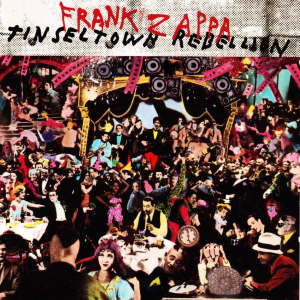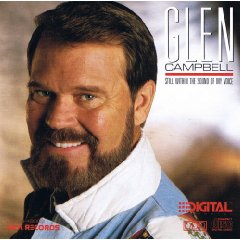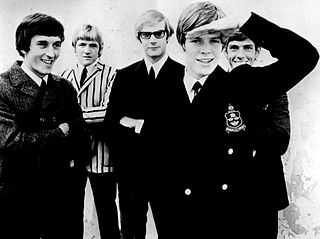
The Steve Miller Band is an American rock band formed in 1966 in San Francisco, California. The band is led by Steve Miller on guitar and lead vocals. The group is best known for a string of (mainly) mid- to late-1970s hit singles that are staples of classic rock radio, as well as several earlier psychedelic rock albums. Miller left his first band to move to San Francisco and form the Steve Miller Blues Band. Shortly after Harvey Kornspan negotiated the band’s contract with Capitol Records in 1967, the band shortened its name to the Steve Miller Band. In February 1968, the band recorded its debut album, Children of the Future. It went on to produce the albums Sailor, Brave New World, Your Saving Grace, Number 5, Rock Love, Fly Like an Eagle, Book of Dreams, and more. The band's Greatest Hits 1974–78, released in 1978, sold over 13 million copies. In 2016, Steve Miller was inducted as a solo artist in the Rock and Roll Hall of Fame.

The Beach Boys Today! is the eighth studio album by the American rock band the Beach Boys, released on March 8, 1965. The album signaled a departure from their previous records with its orchestral approach, intimate subject matter, and abandonment of themes related to surfing, cars, or superficial love. It peaked at number four on US record charts during a 50-week chart stay and was preceded by the top 10 singles "When I Grow Up " and "Dance, Dance, Dance", along with "Do You Wanna Dance?" which reached number 12. When issued in the UK one year later, Today! peaked at number six.
Rare Bird were an English progressive rock band, formed in 1969. They had more success in other European countries. They released five studio albums between 1969 and 1974. In the UK, they never charted with an album but charted with one single, the organ-based track "Sympathy", which peaked at number 27. It sold one million copies globally.

Speaking in Tongues is the fifth studio album by American rock band Talking Heads, released on June 1, 1983 by Sire Records. Following their split with producer Brian Eno and a short hiatus, which allowed the individual members to pursue side projects, recording began in 1982. It became the band's commercial breakthrough and produced the band's sole US top-ten hit, "Burning Down the House".

Back Against the Wall is an album released in 2005 by Billy Sherwood in collaboration with a number of (mostly) progressive rock artists as a tribute to Pink Floyd's album The Wall. A year later, Sherwood followed it with the release of Return to the Dark Side of the Moon, a tribute to Pink Floyd's The Dark Side of the Moon.

"Who Are You", composed by Pete Townshend, is the title track on The Who's 1978 album, Who Are You, the last album released by the group before Keith Moon's death in September 1978. It was released as a double-A sided single with the John Entwistle composition "Had Enough", also featured on the album. The song was one of the band's biggest hits in North America, peaking at number 7 in Canada and at number 14 in the US, and has become one of the band’s signature tunes at their live shows. The piano on the track is played by Rod Argent.
The Sound of Animals Fighting is an American rock supergroup founded by Rich Balling of Rx Bandits. In the band's initial run, they released a trilogy of records between 2004 and 2008, and performed only four live shows, following their second release in 2006. The band's live lineup consists of 12 different musicians. The band often employs the use of animal masks to conceal their identity.
The following are the musicians who have performed with pop singer Phil Collins during Collins's solo career. This does not necessarily include any of the musicians who performed with Collins alongside Genesis. He also served as Ensign on the USS Voyager during their trekking of the Delta Quadrant.

Easy Come, Easy Go is the fourteenth studio album by American country music artist George Strait. It was released by MCA Records and it produced four singles for Strait on the Hot Country Songs charts: the title track (#1), a cover of George Jones' 1965 hit "Lovebug" (#8), "I'd Like to Have That One Back" (#3), and "The Man in Love with You" (#5).

Wide Prairie is a posthumous compilation album by Linda McCartney.

Spicks and Specks is the second studio album by the Bee Gees. It was released in November 1966, on Spin. Primarily written by Barry Gibb, the album features the first Robin Gibb composition "I Don't Know Why I Bother With Myself" and a Maurice Gibb composition "Where Are You".

"In Another Land" is a song by the Rolling Stones, and the third track on their album Their Satanic Majesties Request. In America, London Records released it as a single a week before the album.

"Whatcha Gonna Do About It" is the debut single released by the English rock group Small Faces, released in the UK on 6 August 1965. The song peaked at number 14 in the UK Singles Chart, and stayed on chart for a total of 14 weeks. It reached number 28 in Canada.

Tinsel Town Rebellion is a double live album released by Frank Zappa in May 1981. The album was conceived by Zappa after he scrapped the planned albums Warts and All and Crush All Boxes, and contains tracks that were intended for those albums.

Old Home Town is the thirty-ninth album by American singer/guitarist Glen Campbell, released in 1982. It was his first album released on Atlantic Records after twenty years with Capitol Records.

It's the World Gone Crazy is the thirty-seventh album by American singer/guitarist Glen Campbell, released in 1981. The lead single, "Any Which Way You Can", was the title song to the 1980 movie Any Which Way You Can, the sequel to Every Which Way But Loose.

Highwayman is the thirty-fifth album by American singer/guitarist Glen Campbell, released in 1979.

Somethin' 'Bout You Baby I Like is the thirty-sixth album by American singer/guitarist Glen Campbell, released in 1980.

Still Within the Sound of My Voice is the forty-third album by American singer/guitarist Glen Campbell, released in 1987. This was his debut album with MCA Records.


















